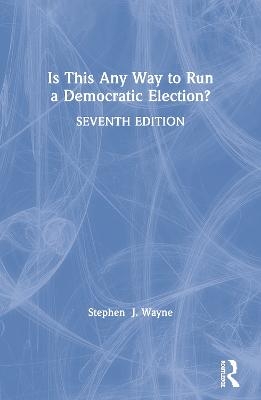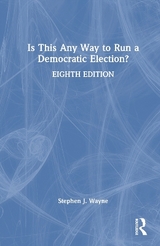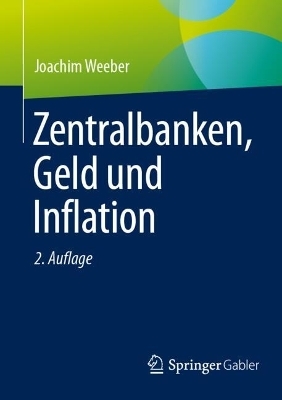
Is This Any Way to Run a Democratic Election?
Routledge (Verlag)
978-0-367-33643-1 (ISBN)
The 2016 and 2018 elections are over, but looking ahead to the 2019–2020 election cycle, the debate over the fairness and accuracy of our electoral process has never been more contentious. Hacking, fake news, a "rigged system," voter ID challenges, Super PACs, and an Electoral College defying the popular vote count all lead to a common question and concern: Is this any way to run a democratic election?
New to the Seventh Edition:
New data and timely illustrations from the 2016 and 2018 elections, looking ahead to 2020 election.
The growing importance of social media (Facebook, YouTube, Twitter) and its impact, good and bad, on recent campaigns.
Foreign interference in the 2016 and 2018 national elections.
The integrity of campaign communications—hacking, rumoring, instantaneous news, and the effect of fact-checking.
Money: the role of Super PACs and billionaire donors; the impact of campaign spending on the candidates and on election outcomes.
New connections between the "Did you know that" chapter introductions to the exercises at the end.
More online references in the suggested readings.
Stephen J. Wayne (BA—University of Rochester, MA, PhD—Columbia University) is a well-known author and lecturer on the American presidency and electoral politics. A Professor of Government Emeritus at Georgetown University, he has also taught at United States Naval Postgraduate School, Ohio Wesleyan University, and The George Washington University. A Washington-based "insider" for over 50 years, Wayne is frequently quoted by White House journalists and regularly appears on television and radio news shows. He has written or edited 12 books, published in 31 editions, and written over 100 articles, chapters, and reviews that have appeared in professional journals, scholarly compilations, newspapers, and magazines. Professor Wayne lectures widely at home and abroad to international visitors, college students, federal executives, and business leaders. He has testified before Congress on the subject of presidential elections and governance and before Democratic and Republican party advisory committees on the presidential nomination processes. He participated in transition projects for the National Academy of Public Administration and the Presidency Research Group.
1. Democratic Elections: What’s the Problem? 2. Popular Base of American Electoral Politics 3. How Representative Are American Elections? 4. Has Money Corrupted Our Electoral Process? 5. News Media Coverage: Fair or Unfair? True or False? 6. Are American Parties Still Representative? 7. The Nomination Process: Whose Is It Anyway? 8. Campaign Communications: How Much Do They Matter? 9. Elections and Government: A Tenuous Connection
| Erscheinungsdatum | 11.09.2019 |
|---|---|
| Zusatzinfo | 26 Tables, black and white |
| Verlagsort | London |
| Sprache | englisch |
| Maße | 152 x 229 mm |
| Gewicht | 453 g |
| Themenwelt | Geisteswissenschaften ► Philosophie |
| Sozialwissenschaften ► Politik / Verwaltung ► Staat / Verwaltung | |
| ISBN-10 | 0-367-33643-X / 036733643X |
| ISBN-13 | 978-0-367-33643-1 / 9780367336431 |
| Zustand | Neuware |
| Haben Sie eine Frage zum Produkt? |
aus dem Bereich



